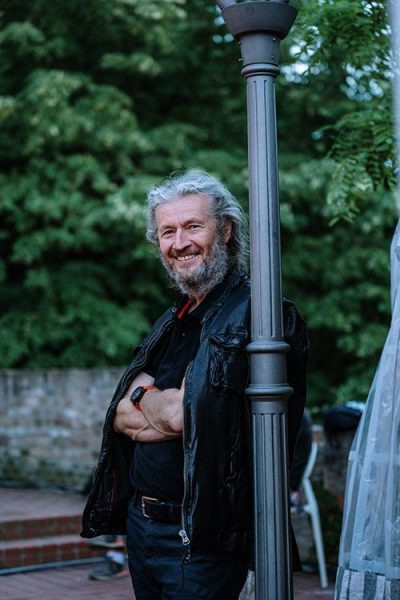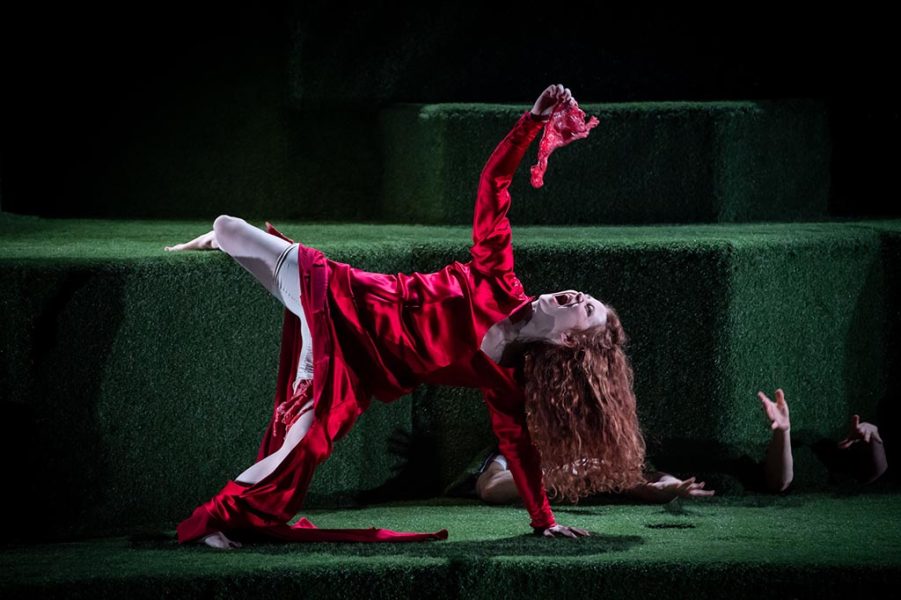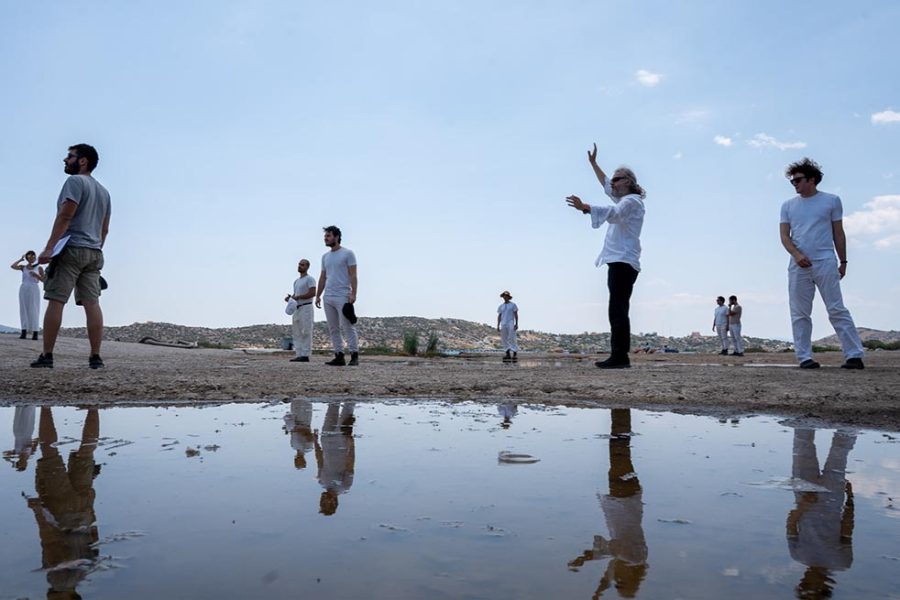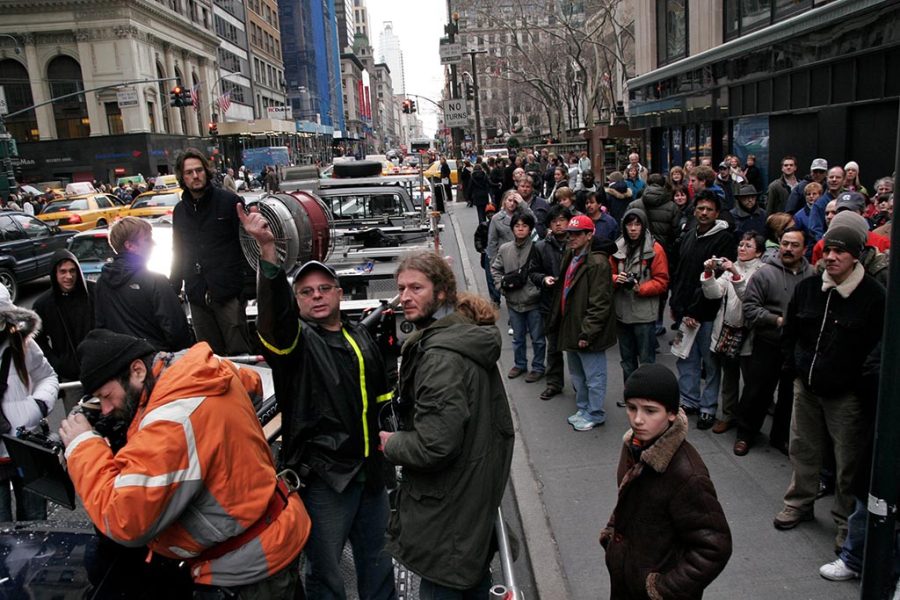He became the artistic director of Bitef as of this year, while he has previously directed plays in the countries of the former Yugoslavia, but also in Vienna, Athens, London, Delphi, Epidaurus and elsewhere. He is the recipient of several Sterija Awards, while in Athens he was recognised as the best director of that year for his staging of Chekhov’s Three Sisters. He has staged the play Henry VI at London’s Globe Theatre, which was even performed in Serbian! He has long been a professor at the Academy of Arts in Novi Sad, while in 2014 he also founded the Shakespeare Festival in the village of Čortanovci near Inđija, which attracts large audiences in early summer
Nikita Milivojević (62) was born in Vojvodina, in Inđija, which he describes as his own Ithaca, his personal Yasnaya Polyana, or Bergman’s Island of Fårö. His ancestors hailed originally from Montenegro, which they departed bound for Dalmatia. Nikita believes that he has forever imprinted within him, like two strongly contrasting elements, the wintry scenes of the Srem plain and the baking stone of Dalmatia. As Andrić stated: ‘every man is indebted to his homeland’.
“In my case, ‘homeland’ refers to two locations: Inđija, where I was born; and Dalmatia, or more precisely the village of Polača near Knin, form where my parents hailed and where I spent most of my summer and winter school holidays. When I recently found myself back in those parts of Dalmatia after many years, I was surprised by how many of the different sights, smells and sounds have lived on in my memory. To me, my parents’ village was something like Macondo for Márquez: a place filled with mythical, unbelievable stories, events, characters… The story of my roots has always been important to me. The first documentary film that I made was inspired by an event linked to life in those lands.”

A happy childhood in a small town implies, first and foremost, unbridled freedom. As a child, Nikita would spend all day on the street, playing, only heading home when he felt hungry.
“Spreading in front of my house, like some sort of huge carpet, were gardens (they are still there today) that were always full of people, who were planting something, digging, watering plants etc. Through the middle of those gardens ran a stream, and everything was somewhat reminiscent of an idyllic landscape created by a painter. As I’m a ‘winter child’, winter and snow hold a special place in my memory. That’s probably why snow often falls in my plays.” Fleeing from the Turks who’d invaded Montenegro, Nikita’s ancestors settled in Dalmatia, in the lea of Dinara mountain.
“That’s why my mother’s maiden name was Crnogorac [Montenegrin]. When listening to countless stories about life in those lands, I always wondered how people could live in that rocky, harsh environment. Due to their life being a struggle in the true sense of the word, many of them naturally departed in search of better living conditions, and that’s how my father ended up in Vojvodina. The Dalmatian folk were known as good builders, who were particularly renowned for their ability to work with stone. And with lots of construction going on in Belgrade and the surrounding area at the time, they very quickly managed to cope. My mother went to Pula to attend school very early on, with her oldest brother having lived there, and to this day she still remembers how to speak a little Italian. It was from her that I inherited my kind of ‘artistic streak’, curiosity, energy, tenacity… and particularly the passion for reading. I find it amazing that she’s still constantly reading something, has an interest in various things, is constantly planning something…”
When the son of a friend of mine, who was then 12 years old, told me that he’d never been to a cinema, I decided to reopen the cinema in Inđija… I consider that one of the best things I’ve done in my life
His father was often away from home due to his work. Nikita was 11 when his brother was born, and he spent most of his time with his mother. As a very hardworking and curious woman, she determined some of the most important life principles that formed his character. He summarises the essence of his upbringing with the phrase ‘less is more’. Cinema left an indelible mark on Nikita’s childhood.
“My friend received a small children’s film projector as a New Year’s present, and that’s how, at his place, I first discovered film. That’s among the strongest and most important experiences of my childhood. A white sheet was spread out in a darkened room and, when the projector was turned on, a magical line of light appeared, which turned into moving images projected on the whiteness of the canvas… Miraculous! Returning from a trip later, my uncle brought me as a gift a small ‘optical box’ [slide viewer light box], in which I could place photo slides, which enlarged in the box thanks to the ‘lens’, which was actually a magnifying glass, creating a kind of ‘magic lantern’ illusion for me. That was one of those experiences that remains imprinted in the deepest part of our unconscious.

Bergman devoted an autobiographical book to that and even made a film. I belong to the generation for which cinema represented one of the most important institutions in life. Later on, during the time of my studies, my ‘best man’ Živko Popović and I literally went to the cinema every night, which was a special experience for me. And then, in the 1990s, the cinema in Inđija closed down, like so many others across the country. During one of my ever-rarer visits home, the son of a friend of mine, who was then 12 years old, told me that he’d never been to a cinema!? That was totally unbelievable to me. That’s why I decided to reopen the cinema of my childhood in Inđija. I named it Stalker, after the film by Tarkovsky. I consider that one of the best things I’ve done in my life.”
He’d wanted to study literature, but it was more for the sake of socialising that he sat the entrance exam for directing, which he completed at the Academy of Arts in Novi Sad. Although he’d spent that summer preparing well, he thought it unlikely that he’d pass, and that he’d subsequently enrol in what he’d planned: literature.
What I remember in particular about that entrance exam was the smell of the stage. I could say that I actually fell in love with the theatre because of that smell! The stage has a special aroma: the curtains, costumes, lights… incredibly exciting
“What I remember in particular about that entrance exam was the smell of the stage. I could say that I actually fell in love with the theatre because of that smell! The stage has a special aroma: the curtains, costumes, lights… For someone who was feeling all that for the first time, it was something incredibly exciting. The only other things that had smelt like that to me were new books for obligatory reading when I received them at the start of the school year.”
A story exists about how Nikita prepared for his first directing exam at an army barracks with soldiers, and how his professor, Boro Drašković, had come to the barracks in Niš for that exam.
“It just so happened that I had to do my military service after the entrance exam at the Academy, and then a law was introduced that meant 18-year-olds had to go to the army immediately after finishing high school. In my case, this meant that, by the time I returned from the army, my peers with whom I’d been admitted to study directing would already be in the second year of their studies, while I would have to start with the first-year students and the professor who was taking the class that year. In order for me to remain in his class, Boro Drašković set an almost impossible precedent. He suggested that I take my first-year exam from the army. And so it was that I didn’t attend the first year of directing studies, but rather I ‘served’ it and entered the second year of directing studies directly. I carried out a dramatic adaptation of Chekhov’s short story The Chameleon, dividing the roles among my fellow soldiers. We snatched time for rehearsals during various breaks and somehow succeeded in creating a play that we performed in the empty auditorium of the military club in Niš, exclusively for professor Boro Drašković. That’s how I passed, and the stage of the Niš barracks’ military club was my first theatre.”

Nikita’s first direction job was on Eugène Ionesco’s play ‘Jack, or The Submission’, in the Salon of the Yugoslav Drama Theatre, and it became famous for the beans that were served to the audience. The audience had actually been invited to a wedding, which is how they were seated, at wedding tables that had been placed along the walls of the Salon. And then, at one point in the proceedings, real homemade beans were served, which arrived for each performance from a tavern located across the street from the theatre, together with live music. It appeared as though reality was entering the play, directly from the street.
“What I will certainly remember forever is the first criticism that I then received, in NIN. Vlada Stamenković praised the play exceptionally, under the headline ‘Victorious Imagination’.
During the 1990s, Nikita’s plays – In the Hold, Banović Strahinja, A Midsummer Night’s Dream etc. – found themselves at the centre of the attention of the domestic theatre scene. At that juncture, Yannis Houvardas, director and owner of Amore, the most prestigious off-Athens theatre, was on the hunt for a young director from Serbia and got in touch with Nikita. When he staged his first play, Chekhov’s Ivanov, which proved to be a huge success, Nikita was invited to direct the following season at Yannis’s theatre. That had been the play Crime and Punishment, and – together with an exhibition of Goya’s paintings – it was declared the cultural event of the year in Athens! From that moment, the doors of many theatres were opened to him.
There were more than 100 theatres in Athens when I arrived, while today there are nearly 200! At that time, for me, Greece meant, among other things, a new maturing. My horizons broadened and I discovered many new things
“I’d arrived in an environment that was much richer than ours in every sense. There were more than 100 theatres in Athens at that time, while today there are nearly 200! One of the first big surprises for me was the very well-developed and interesting alternative scene. The Amore Theatre, for example, was a famous summer cinema, with a wonderful open rooftop terrace. At that time for me, Greece meant, among other things, a new maturing. My horizons broadened, I discovered many new things, met numerous interesting people. Unfortunately, in our country so much has been changing for the worse for many years, and so it was that the theatre hasn’t been spared either. Time and concentration are required for serious work… It is impossible to create a serious play without discipline, dedication, research, normal time for rehearsals. Whenever I talk about this, I know that I prompt indignation among many of my colleagues, while I simultaneously know that many of them share my opinion. The essential problem is our theatre system. One director recently told me that he didn’t have all the actors together for a single rehearsal, not even for the pre-premiere rehearsal!?” Since 2014, when he established the Shakespeare Festival in Čortanovci, this summer theatre event has become an inextricable part of this director’s life.
“The notion that a Shakespeare festival would be born in Čortanovci, and that it would even be opened by Shakespeare’s own Globe Theatre from London (with nothing less than Hamlet itself!?) – I don’t believe anyone could have imagined that even in their wildest dreams. Over the course of ten years, Villa Stanković has become an incredibly positive and exciting place, a genuine world stage. Our guests have included theatres from Iran, the U.S., Finland, Georgia, the UK, Belarus, Turkey, Germany, Armenia, India, China, Greece, Slovenia, North Macedonia, Croatia… Approximately 25,000 people have attended the Shakespeare Festival throughout all these years. and have to date watched more than 60 plays.”

At this year’s edition of the festival, we watched the great play Twelfth Night, directed by Nikita’s student Ivan Vanja Alač. We asked Professor Milivojević if he finds it easy to recognise the talent of a future artist during their studies.
“There is that saying in Bosnia that coughing and poverty can’t be hidden. I also believe that talent can’t be hidden. Of course, talent is something that must be developed; if it doesn’t progress – it regresses. Vanja Alač is precisely one of those talented people whose talent is developing continuously. When I see that they are talented and diligent, I feel an obligation to support them. As a rule, my students always perform in my plays, and the directors are regularly my assistants on plays. If you are teaching them something, you should somehow also show that you believe in them, in what we’ve gone through together during the studies.”
Nikita was this year appointed artistic director of the Bitef festival. When asked how much that is a source of joy for him, but also a source of fear, he responses by noting that Bitef is one of our country’s most important cultural institutions, firmly entrenched in the identity of Belgrade and Serbia.
The essential problem is our theatre system. One director recently told me that he didn’t have all the actors together for a single rehearsal, not even for the pre-premiere rehearsal!?
“That is, of course, a source of serious motivation for any person of the theatre; to be part of such a great story. However, considering that this is a kind of ‘return’ to Bitef for me, a very special, personal reason also exists. Specifically, I consider the four years – between 2005 and 2009 – that I spent at Bitef as being a very important and creative period of my theatre life, so I now view my arrival in the position of artistic director of Bitef as a kind of return home. I once spoke about the fact that one of the most beautiful things that’s ever happened to me in all the years that I’ve been in the theatre is connected to that time specifically, or more precisely to the moment when I was leaving Bitef, in 2009, and the entire collective signed a petition for me to stay for another four years. Of course, that shouldn’t have any special meaning to anyone but me, but it’s still worth mentioning because it isn’t commonplace in our country. This invitation to return to Bitef, given that it came from Bitef itself, could represent a kind of continuation of that story. Regardless, it’s always nice to go where you know you’re welcome.”
When it comes to the history of Bitef, Nikita recalls in particular – apart from numerous plays – his meeting with Otomar Krejča (1921-2009) following the premiere performance of his play In The Hold. Krejča was a big name of European theatre and many still fondly remember his adaptation of the play Three Sisters, for which he also won the main prize at Bitef.
“That meeting and conversation with Otomar Krejča was something important for me. Then there was everything that he said the next day at the Roundtable; the way he spoke. That all left a powerful impression on me at the time. In his assessment of the Festival following the culmination of that edition of Bitef, the critic from Politika [newspaper] wrote that the greatest event for him was ‘what Krejča said about the play In The Holdʻ. Apart from commending the play, that was also an interesting consideration of the great director regarding contemporary theatre and how he saw it.”
In his capacity as artistic director, Nikita believes that this year’s Bitef will, first and foremost, be extremely diverse, with an abundance of varying forms.
Photos: Jelena Ivanović